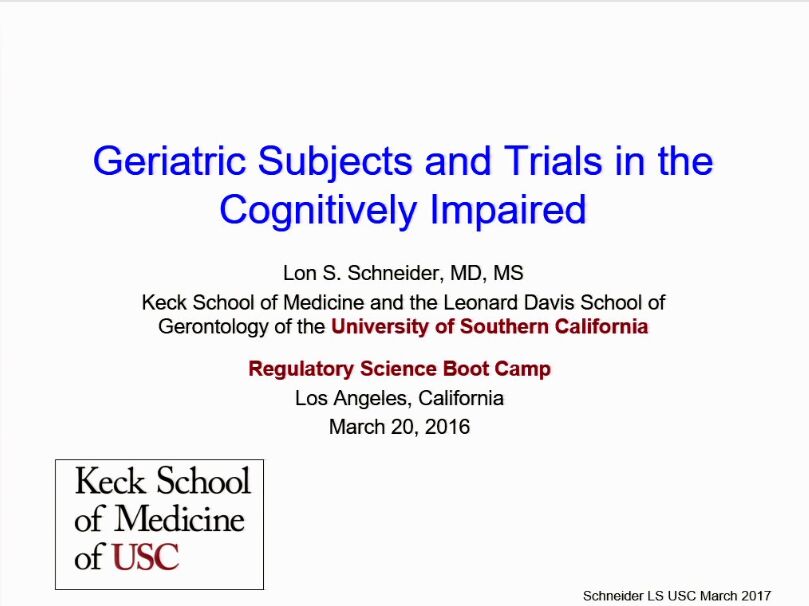- Background:
- Despite risk of cognitive impairment as projected by studies, actual incidence is uncommon before age 70 and mostly occur above 80.
- Cognitive impairment trials can range from 6-12 weeks, extend for 4-5 years. Very small differences between placebo and treatment groups, hence research focuses on getting small effects. Amyloid is major target for AD.
- Roadmap for FDA approval of drug for AD: less than 100 patients in P1, 200-300P2 (proof of concept), P 3 confirm effectiveness 400-700 patients.
- Diagnosis:
- Heterogeneous population of patients, Ineffective diagnosis.
- Mild Cognitive Impairment (MCI)/(Prodromal AD): same intellectual impairment but low functional impairment
- Preclinical AD: Brain pathology but very little cognitive and functional impairment
- Preclinical AD concept:
- Identification of Preclinical AD: Patients who think they have memory impairment, use biomarkers.
- It is staged into three:
- Asymptomatic amyloidosis- High PET amyloid tracer retention
- Amyloidosis + Neurodegeneration – Neuronal dysfunction on FDG-PET/fMRI, high CSF tau/p-tau, cortical thinning/hippocampal atrophy on sMRI
- Amyloidosis + Neurodegeneration + subtle cognitive decline – evidence of subtle change from baseline level of cognition which yields poor performance on more challenging cognitive tests and does not meet criteria for MCI.
- Vulnerable participants and role of study partners:
- Not actually vulnerable but impaired cognitive function makes them vulnerable.
- Informed consent requires an assessment of participant’s comprehension of research, participation
- what are you being asked to do
- what question is this study trying to answer
- what are the potential risks of participating,
- frequency of visits,
- difference between participating and standard medical care
- withdrawal procedure.
- Surrogates decision maker- advance care directive agent, guardian, spouse, adult daughter/son, parent, sibling, adult grandchildren or next closest relative.
- Outcomes used in cognitive impairment trials:
- Clinical outcomes: ADAS-cog, MMSE, ADCS-ADL, Instrumental ADLs, Global ratings (CDR, CIBIC/CGIC), composites and Neuropsychological tests. Behaviour ratings, quality of life, services utilization and caregiver ratings are considered as well.
- Behaviour ratings and Quality of life
- Biomarkers: not validated, change over time, not predictive of clinical change.
- FDA guidance: Conditional marketing for efficacy over cognitive outcome, MCI-requires single composite outcome for efficacy
- Targets and drugs for early stage interventions:
- Potential targets: food/nutritional supplements like Vitamin E, D, B and DHA, Resveratol, Ginkgo biloba extract and repurposed drugs.
- Future: Trial databases to model and simulate proposed trials, targeted designs, personalized approaches to N of 1, basket and umbrella trials and expanded indications.
Regulatory Science Symposium: Special Populations Session 7: Geriatric Subjects and Trials in the Cognitively Impaired (2017)
In this session, we will discuss the research for cognitive impairment outcomes and targets for interventions.
Course Syllabus/Topics
Acknowledgement
Accompanying text created by Vaibhavi Chokshi | Regulatory Science Graduate Student Worker | vmchoksh@usc.edu

